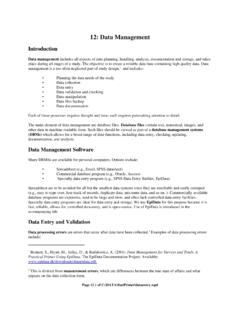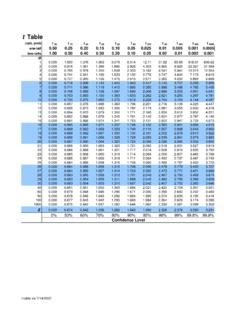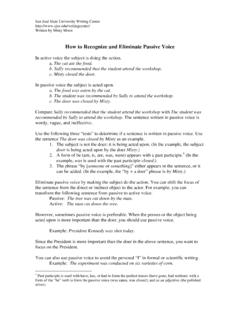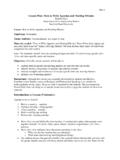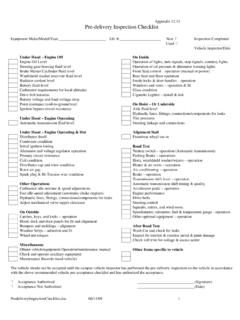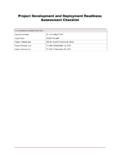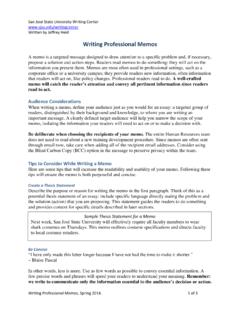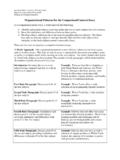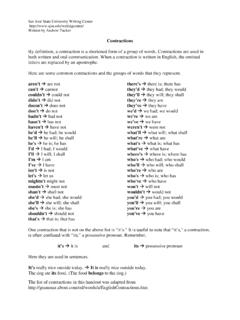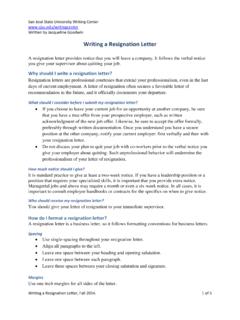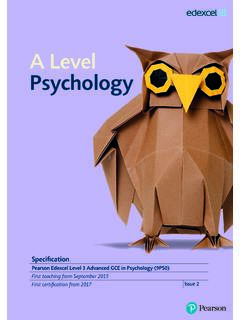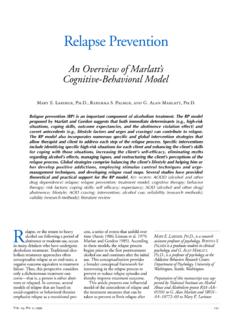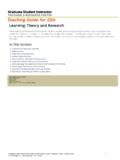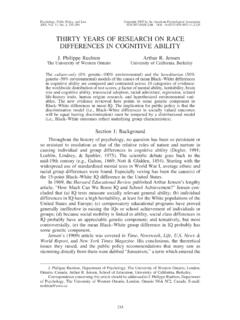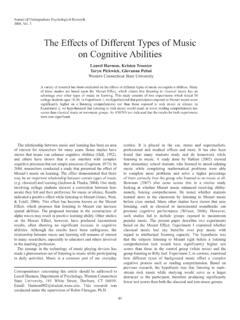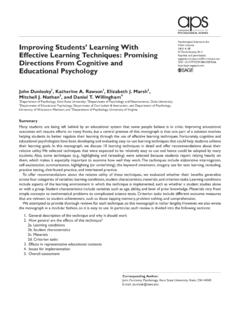Transcription of COGNITION Chapter 1: Introduction Fundamentals of ...
1 COGNITIONC hapter 1: IntroductionFundamentals of cognitive psychology (Kellogg)Fall 2013 Mark Van SelstSan Jose State UniversityPsychology 135, CognitionSection 3, Fall 2013 Instructor: Mark Van Selst Telephone: 408 924 5674 Email: psychology Faculty Van Selst ..)Class Days/Time: Monday and Wednesday 9:00 10:15 PMClassroom: DMH 359 Office Hours: Monday and Wednesday 10:30 11:45 Office Location: DMH 314 ( Jump the Advising Line )(also advising Tuesday 10-12 and 2-4 so will be around)Prerequisites: PSYC 1 (General psychology ) Class ID Number: 42693 What is COGNITION ?.. and where have you seen the term outside of this class?Syllabus (Green Sheet)Course Scope: an Introduction to the general topic of "how people think" (this course is an overview of a broad range of topics)Memory: The mental processesof acquiring and retaining information for later retrieval, and the mental storage systemin which these processes : The collection of mental processes and activities used in perceiving, learning, remembering, thinking, and understanding, and the act of using those Definitions of CognitionCognition: (People Think) cognito= "to know" co = "together" gnoscere= "know The collection of mental processes and activities used in perceiving, learning, remembering, thinking, understanding, and the act of using those processes.
2 The study of how people perceive, learn, remember, and think about Description and Required TextCourse Description The activity of knowing: acquisition, organization and use of knowledge. Processes involved in that activity, including perception, memory, thinking, and language. Required Textbook Kellogg, (2007). Fundamentals of cognitive psychology . Sage. ISBN 978-1-4129-3692-7. The Second edition (1st edition mostly )Course topicsChapter 1: Introduction to cognitive PsychologyChapter 2: PerceptionChapter 3: Attention and ConsciousnessChapter 4: Memory systemsChapter 5: Remembering eventsChapter 6: Memory distortionsChapter 7: Knowledge RepresentationChapter 8: LanguageChapter 9: Problem SolvingChapter 10: Reasoning and Decision makingCore Concepts (Kellogg) Mental representations hierarchical systems cognitive architecture Stages of processing Serial vs. parallel processing Memory stores Consciousness EmotionFinding Course-Relevant Faculty and Van Selst (http) You WILL need access to SJSU library GoalsGoal 1.
3 Knowledge Base of psychology : Students will demonstrate familiarity with the major concepts, theoretical perspectives, empirical findings, and historical trends in cognitive 2. research methods in psychology : Students will understand basic methodological approaches used in cognitive psychology , including research design, analysis, and 3. Critical Thinking Skills in psychology : Students will understand and be able to use critical and creative thinking, skeptical inquiry, and a scientific approach to address issues related to behavior and mental 4. Application of psychology : Students will understand and be able to apply psychological principles to individual, interpersonal, group, and societal 5. Values in psychology : Students will value empirical evidence, tolerate ambiguity, act ethically, and recognize their role and responsibility as a member of assignments (see schedule, 3-5% each [49%]) Wednesday, Sept 4 Asst 1 (Scope and Concepts) [3%]4 mostly non-cumulative exams [51%] Wednesday Sept.
4 18th[10%, Chapter 1-2] Monday Oct. 21st[15%, Chapter 3-5] Wednesday Nov 6th[6%, Chapter 7-8] Wednesday Dec 11th(7:15AM)[20% (final), Chapter 9-10]The course will be graded out of 100 (60% for a D-pass)IntroductionsME UBC, Waterloo, NASA-Ames, SJSUDual-Task, Alcohol, Decision Making, Visual COGNITION , Consciousness(and sailboat racing)YOUname, program, when do you expect to graduate? future plans?EXPECTATIONSS ocial Expectations: you are adults, I am human Etiquette Disability / Modifications Exam Rescheduling (exam early) Academic Expectations: Lateness is bad (be sure to keep current work on time) Plagiarism is worse Poor grammar, illegible text, or unintelligible writing will hurt your gradeAssignment 1: ConceptsGOAL: To have you demonstrate your grasp of one (or more) of the concepts that will be covered under the broad umbrella of cognitive psychology (if there is any question: ask ). This assignment is deliberately exploratory, I expect you to think about what information or insights cognitive psychology might provide rather than necessarily having you do the research to reveal the current status of our full understanding of the phenomena from the literature.
5 I do expect you to have verified that the concept is one that is appropriate for treatment from a cognitive psychology perspective. Other than perceptual and procedural errors, many other issues related to memory, language, or processes of object recognition are all central to cognitive psychology and would be fruitful for you to consider prior to our in depth treatment of the underlying scientific 1 (Continued) Preview the text chapters come up with a real world situation that you have personally encounteredthat relates to cognitive psychology . , bank machine, a BART ticket dispenser, a cell phone, a fuel pump, a poorly organized textbook) A simple example of a cognitive "design-facilitated error" is pulling on a door equipped with a pull-handle that you are supposed to push the user of the device is cued by the shape of the handle [the affordance] to push rather than pull based upon prior learning.
6 To help you think about the problem, you may want to think about what would be required to fix the problem. Use appropriate technical terms (with definitions) and cite your sources. It is often useful to check text definitions (even if from later in the text it is ok and even recommended to read ahead into the appropriate chapters) to ensure that you are using technical terms correctly. Since so many of the examples use automatic versus controlled processes as a starting point, I will mention that differences between automatic and controlled processes are discussed on Page 77 of the Date: start of class, Wednesday, August 1 (Continued)Two pages, double-spaced, 12 point or larger typeface for each of the assignments. I will not grade beyond the first two pages. the event and the underlying the relevant cognitive process or tie the two together Note: It is always a good idea to include the definitions (and page numbers) from the & Foundations of cognitive Processes Exist Why say this?
7 History of Behaviorism (struggle in the mid-50s in proving that thought and mental processes could be subject to scientific empirical research ) Commitment to Objective Observational methods Why say this? History of Processing Approach Why say this? This metatheory(overall approach) captures the philosophy of cognitive psychology History of the cognitive ApproachThe history of what we now call cognitive psychology is largely the history of whether or not we can infer the existence what we cannot directly measure with additional flavoring by the current view of knowledge. RATIONALISM (PLATO) Plato (ca. 428-348 , The Republic): Plato posits a tripartite division within the self: the rational soul (mind or intellect), the spirited soul (will or volition), the appetitive soul (emotion or desire) Rationalism: Knowledge is acquired through logical (Aristotle) Aristotle(384-322 ): Empiricism: Acquisition of knowledge through experience and observation (Locke) tabula rasa (blank slate).
8 Rationalism vs. EmpiricismRationalism Phenomena can be understood through careful thought and logical proof reason is the best route to knowledge logical deduction Knowledge comes from intellectual effort (logical proof derived from the basic 'fact' of thought -Descartes) Logic/Rationalism led to Descartes(1596-1650) "Cogito, ergo sum" [I think, therefore I am] Empiricism Phenomena are to be investigated by careful objective observation Methodological Prescription: rely on observation & measurement "Straight from the horses mouth Aristotle s (384-322 BC) Empiricism ( unscripted tablet )led to John Locke s(1632-1704) "tabula rosa" [blank slate] view of human experienceImmanuel Kant brought Descarte and Locke s views together in arguing that both must function together in the quest for Approaches to Understanding PhenomenaRationalismEmpiricismStructural ism elementary units of thought / consciousness ("IS").
9 Seeks to understand the configuration of the elements of the mind and its perceptions by analyzing the perceptions into their constituent components (mode, form, quality, duration, etc.) Functionalism Organism in Environment ("IS FOR").. a very pragmatic knowledge is useful in that it can be applied to things ( , William James)Associationism The study of the linking together of two events, objects or ideas because they tend to co-occur (Paul Broca: 1861). Mental processes operate by the association of a mental state with its successor states. Behavioroccurs because of trial and error. Knowledge come from experience ( , British Associationists: John Locke, David Hume, John Stuart Mills; the related Empiricismis the doctrine of the superiority of experience over innate factors [this also influenced the development of Darwinian Evolution]) .. the law of effect (Thorndike)Behaviorism: (extreme version of Associationism: only can examine observables )[see next slide]Nativists Biology/Genetics largely determines abilities and tendencies.
10 This is the classic "Nature" side of the Nature/Nurture DebateBehaviorism Behaviorism can be seen as an extreme extension of Pavlov s work Antimentalistic (Mental Activity is seen as Epiphenomenal at best; mental processes do not exist or are unimportant) Nomothetic (defining the typical or average process) Replicable / Cumulative Experimental Development of the experimental method Use of rigid definitions (Operational Definition) Use of postulated mechanism of operations Testable claimsBEHAVIORISM John B. Watson (1878-1958): banishment of consciousness from scientific study Observation Measurement Repeatability BEHAVIORISM: It is only appropriate to study observable responses and their relation to observable stimuli S-R psychology : (Stimulus Response) : We don t eat because we feel hungry, eating is an observable response that occurs in the presence of a verifiable stimulus, low insulin levels or viewing a plate of croissants Behaviorism was the dominant approach in the US for the first half of the 20thcentury before being rejected for its inability to accommodate cognitive IN HISTORYNote that this is only one possible history.
